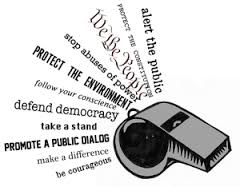Whistle blowing is voluntary release of non public information,as a moral protest,by a member of an organisation outside the normal channels of communication to an appropriate audience about the illegal activities in the organisation or any activity which is against public interest.The person who informs about the misconduct of the organisation is known as a whistle blower.He has a strong sense of right and wrong and want to make sure that is voice is heard.
MOTIVES OF WHISTLE BLOWING
- To ensure ethical conduct in the business.
- To protect public interest by reporting wrong practices in the organisation.
- To motivate the managers to act morally or else their immoral acts can be reported by the whistle blowers.
- To highlight the possible risk of using the certain product or technology.
- To minimize the organisation’s exposure to the damage that can occur when employees circumvent internal mechanisms.
FACTORS TO BE CONSIDERED BEFORE BLOWING A WHISTLE
- The person must know the possible consequences of blowing a whistle. Sometimes there is a high possibility of harm to the person.
- Objectives of the whistle blower must be known in advance.
- Allegations must be appropriate and backed by proofs.
- Right choice must be made regarding the choice of channel of communication.
- All other technicalities must be completed before blowing a whistle.
Example of whistle blowing in India- Satyendra Dubey blew the whistle by sending a written complaint to the Prime Minister Office alleging huge irregularities and corruption in the then Prime Minister’s Golden Quadrilateral Project. He was not provided with any protection and was ultimately killed by the construction mafia in 2003.
LEGAL ARRANGEMENTS FOR THE WHISTLE BLOWERS
- The Whistle Blower Protection Act,2011 provides a mechanism to investigate alleged corruption and misuse of power by the public servants and also protect the person who exposes alleged wrong doing.
- The Act seeks to protect the whistle blower making disclosure of facts related to act of corruption, misuse of powers or any other criminal offence by a public servant only. No protection is given top any private sector employee.
- Every complaint has to include the identity of the complainant or else the complaint would be considered invalid.
- The Act also lays down penalties for those making false complaints knowingly.
- The act doesn’t address two important issues,ie, non admission of anonymous complaints and lack of punishment to those who victimize whistle blowers.
Click here for government certification in Accounting, Banking & Finance





18 Comments. Leave new
Well written and described.. good job!! 🙂
Whistle blower has an important role in an organisation.. well written 🙂
Nice.. learnt something new
More than getting to know the truth, it is necessary to protect these whistleblowers. Enough protection is not given to them in most countries.
nice
very well written…the legality of whistle blowing is something new that I learnt
Good article well explained
learnt a lot
Informative and well written
quite informative. got to learn a lot!! Good work 🙂
Whistle blowing is an enjoyment…! well written
Nicely written !
good hardwork
nice and interesting article
Hey, do you think blowing a whistle is justifiable as a crime?
Whistle blowing laws should be made more stringent in India to protect the whistleblowers.
Whistle blowing fails in case of internal marketing….. which goes with in the business illegally and unethically.
very well written
the title is quite good !